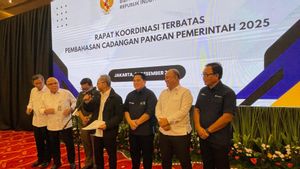JAKARTA - Yuliandre Darwis, Chairman of the Expert Council of the Indonesian Communication Scholars Association (ISKI), stated that the development of information technology in Indonesia has been very advanced. According to him, this is inseparable from the seriousness of the government in building the technology infrastructure to the 3T (underdeveloped, developed, and outermost) areas.
"There is nothing bad about information technology infrastructure in Indonesia. This is evidenced by the high usage of the internet by the millennial generation in Indonesia. The millennial generation as we know cannot be far from using the internet, which of course must be supported by reliable infrastructure," said Yuliandre Darwis in a webinar which was initiated by the Telecommunication and Information Accessibility Agency of Communication and Information Ministry (Bakti Kominfo), Saturday, March 13.
In fact, according to Yuliandre, the largest consumers of internet use in Indonesia come from the millennial generation. A researcher from Ericsson ConsumerLab, some time ago, also mentioned that the trend of technology products follows the behavior of millennial lifestyles.
"Technology products follow the millennial lifestyle. Millennials cannot be separated from Youtube, Facebook, Spotify, Instagram, TikTok, and so on," he explained.
However, Yuliandre continued, surprisingly there has been slackening online security, where data says that 20 percent of the millennial generation likes to share passwords. This of course has the potential to compromise their online security.
"This is what millennials must pay attention to, security surfing on the internet, protection of personal data and behavior in the internet will be something that is corrected and even a weakness of a millennial when using technology," said Yuliandre.
SEE ALSO:
On the same occasion, the Dean of the Faculty of Social and Political Sciences, Padjajaran University, Widya Setiabudi Sumadinata said regarding the demographic bonus, where it is an opportunity but also a challenge where the number of people entering productive age (15-65 years) becomes the majority of the population.
"It is estimated that this demographic bonus will occur around 2020-2030," he said.
The problem, according to Widya, is how can this bonus not become a burden. An abundant workforce, he said, must be accompanied by good quality human resources.
"Who will play a role in the demographic bonus, they are the generation Y or the millennial generation. The first demographic bonus starts 2017-2019, the second is now 2020-2035, and the peak is 2028-2032. So that will be the main players when Indonesia reaches it. The peak of the demographic bonus is that those born between 1980-1995 are the millennial generation or generation Y," he explained.
The English, Chinese, Japanese, Arabic, and French versions are automatically generated by the AI. So there may still be inaccuracies in translating, please always see Indonesian as our main language. (system supported by DigitalSiber.id)


















